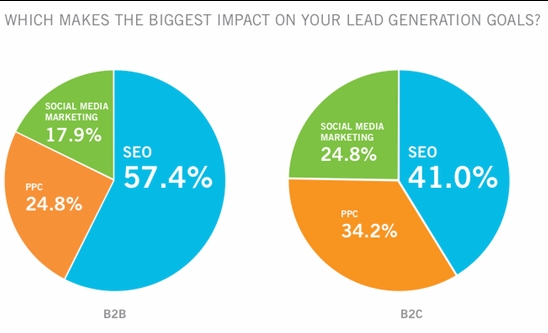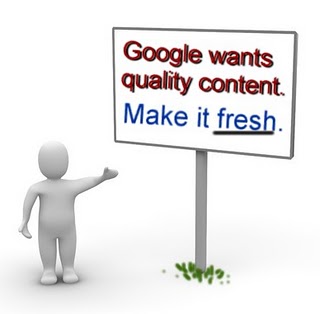Posts tagged web content

4 Steps for Selecting Topics for Blogs and Articles
One of the most critical components of publishing blogs and other articles online for marketing purposes is the proper selection of topics. Topics are such a vital factor in online article marketing because they play such an important role in attracting the right kind of traffic to your website and business.
Traffic is the primary source of potential revenue for any online business. The need to attract quality traffic through web content writing is the key reason why you need to publish useful and beneficial information for your target audience.
The attractiveness of your topics determines the volume of traffic – and thus revenue – they will generate, which are the real measures of success for your online marketing campaigns. So you should select them wisely.
Here are four quick steps of for choosing article and blog post topics that will catch the attention of your target audiences:
1. Identify Need
The main purpose of selecting a great topic is to give your audience what they are looking for. If you can correctly identify their wants and needs, you are on the right path to offering content that they just can’t refuse. One simple way to identify what your target market wants is by researching the most popular keywords they utilize when searching for information using Google and other search engines. One handy way to do this is with the help of a keyword suggestion tools, such as Google’s Adwords Keyword Tool.
Almost everyone now runs to the web for answers to all of their questions, potential solutions to their problems, and lists, tips and procedures for doing something properly. Give them what they want and they will give you their attention.
2. Topics Need to be Related to Your Business
Writing web content to promote your business online will give you a chance to showcase your knowledge and expertise on that niche. Your articles should be directly related to what product or service you sell. This establishes you as “the expert” on your subject or in your field. This can also help build your company’s credibility and win the trust of your readers. These are critically important elements of any business relationship.
3. Research Fresh Issues Related to Your Niche
People are naturally curious, and they will always want to be the “first to know” new and interesting information. This is why fresh, relevant information is so attractive to readers. Take advantage of this by starting a routine of researching the latest issues, trends and developments in your industry or field. Authoritative sites are often your best sources of these, and you should check them out regularly in order to become one of the very first to relay the info to people who share your interest.
4. If You Run Out of Topics, Write a “Tips” List
Tips and “Top 10” lists and how-to guides are still the easiest and most attractive types of articles and blog posts to write if you run out of other fresh topics. People love these types of articles because of their usefulness and power to assist people in doing things on their own. This post itself is one good example of this style of web content writing. And if you need additional ideas, or help sticking to a publishing schedule there are resources that can help you, with Hat Trick Associates just one of your many options.

SEO is Most Important Marketing Method For Any Website

The importance of good SEO (search engine ranking) for your website – built upon a foundation of well-written, high quality content – can’t be overstated or overlooked by your company if you want to be found when customers Google search for a business just like yours…
.

Four Of The Most Common SEO Myths
In the changing world of search engine optimization, SEO, it takes quite a bit of working experience to truly understand how it all works.
The basic premise of SEO is pretty straightforward of course, it’s what web content writers use in order to make their websites more attractive to the search engines, most notably Google. The first point that needs to be noted is that many web copywriters do this ONLY for the ultimate purpose of driving traffic. This can be a big mistake, since visitors to your website who don’t “convert” – turn into sales (or votes, donations, etc.) – are pretty useless, aren’t they?
Interesting, compelling and persuasive web content is what supports the TRUE mission of your website, to improve the bottom line for your business.
Now that we have that critical, and often forgotten, point out of the way we can focus on the SEO benefits that your web content writing creates. Many people have tried to understand and explain how SEO works, but aren’t always correct in their assumptions. This can be attributed to the constantly changing nature of SEO, and which means that the article could be obsolete in a couple months, incidentally. But as of now, here are four of the most common SEO myths that you should know:
More Links Automatically Makes For a Better Ranking
Yes it’s obviously true that a website’s popularity and perceived importance as measured by links is used by the engines to determine its ranking. It shows that others on the web view this particular web content as valuable. However, if your site receives a link from another website which contains NOTHING but links (or close to it), search engines like Google will give these links less influence over the popularity factor of your site, and it won’t do much to improve your rankings. Sites that often fall into this category are those that ask you for reciprocal links, links back and forth between your two sites. And reciprocal links have little (no?) value to begin with; Google knows you are more than likely trying to game the system. The reason it’s impossible to know if there is any worth to these links? Google does not and will never share their algorithm for ranking websites, so we can never be exactly sure what nuances it contains.
Filling Your Site With Keywords And Phrases Boosts Rankings
Keyword stuffing, or using your desired keywords and search phrases an inordinate amount of times within your copy, actually did work “back in the day” – when search engines were less sophisticated and their algorithms weren’t optimized to detect web content quality. And folks did it then to game the system just like reciprocal links (and many other “black hat” ways to trick the engines), and some people still think it has value. But modern search engines like Google, Bing and Yahoo are now quite intelligent. They can verify your web content very much like a human does, and they are trained to identify spam and content that isn’t written with any sense of quality or coherent flow in mind. This is often the kind of content that you will get from foreign SEO companies that promise to throw your content up all over the web. When using these firms for your website content and more high profile outlets and sources, this also means that consumers who come across this content online will be associating its poor quality directly with your company and brands, by the way. But keyword stuffing can’t help to improve your page ranking these days. You should never sacrifice the quality of your content for it, most importantly when this content will be used directly on your own website.
You Can Be Penalized For Duplicate Content
Up to this day, many web content providers and online writers hold onto the belief that duplicate content can negatively affect your search rankings. This is actually a myth, one that we at Hat Trick Associates have exposed and discussed with you before. There is no penalty for duplicate content. But also know that the SEO value of content that is not unique to your site will also not HELP your SEO rankings either, or do so in a very minor way. So only use duplicate content if it actually advances your business goals; if the duplicate web content helps you close a sale then it’s worth the effort it takes to share it. Otherwise spend your time somewhere else.
PageRank Correlates Directly And Precisely With The Search Engine Results Page (SERP)
This is a common myth, but not true. PageRank and search engine results are two independent things. The Google Toolbar’s PageRank feature displays a visited page’s PageRank as a whole number between 0 and 10. The most popular websites have a PageRank of 10, the least have a PageRank of 0. Google has not disclosed the precise method for determining a Toolbar PageRank value. The displayed value is not the actual value Google uses so it can only be used as a rough estimate.
PageRank measures number of sites which link to particular page. The PageRank of a particular page is roughly based upon the quantity of inbound links as well as the PageRank of the pages providing the links. Other factors contained within the algorithm include things like the size of a page, how up to date the page is, the key text in headlines, and the words used for the hyperlinks – the anchor text.
The Search engine results page (SERP) is the actual result returned by a search engine in response to a keyword query. The SERP rank of a web page refers to its placement on the list of search results, where a higher placement equals a better SERP rank.
But the SERP rank of a webpage is not only a function of its PageRank, but also depends on a relatively large and continuously adjusted set of factors (over 200), commonly referred to by content writers and internet marketers as “Google Love”. Search engine optimization is aimed at achieving the highest possible SERP rank for a website or a set of web pages, not the highest PageRank.

